优秀英语教师业务学习笔记范本讲课讲稿
小学英语老师业务笔记2019教师

小学英语老师业务笔记2019教师1、如何上好—节课?很多学生说他们喜欢某个教师,"盼"着上他的课,也有很多学生不喜欢某个教师,"怕"或"烦"上这个教师的课,听他的课就昏昏欲睡,打不起精神。
同样的学生,对不同的教师表现出不同的态度,这值得我们深思。
教师怎样做才能让学生喜欢自己的课呢?第一、积极备课——寻找激发兴趣的切入点。
备课是一个再创造过程,此间,教师不但要备知识,还要从学生的实际出发,了解他们已有的知识储备,努力寻找能够激发他们学习兴趣的切入点﹔在对教材的把握上,首先对本学科的有关概念要正确理解,并能随时了解本学科理论前沿的动态和发展,始终把最新最科学的知识传授给学生,并善于将学科知识与现实社会、学生生活实际相结合进行教学。
其次,教师还要具备基本的社会知识和生活常识,有相关学科领域的知识储备,并能灵活地把各知识点联系起来。
第二、认真授课——营造宽松的学习环境。
在课堂教学过程中,教师要能针对学习内容,学生的经历、兴趣、知识水平、理解力等,设计出富有弹性的灵活多样的教学活动,营造宽松的课堂学习环境,创设自主学习、积极互动参与、探究的课堂教学模式,激发学生的学习自觉性和主动性,师生一起去发现问题、研究问题、解决问题。
第三、语言和板书——课堂的通行证。
马卡连柯说过这样一句话:"同样的教学方法,因为语言不同,效果就可能相差20倍。
"教师应做到语音标准,用词恰当,表达连贯,清楚准确,精练简洁,形象生动。
好的板书简洁、形象,字迹工整清秀,带有很强的启发性和欣赏价值,也有助于学生对知识的理解和记忆,并能给学生以美的享受。
第四、充满热爱之情——注入人生不竭的动力。
一位优秀的教师要有角色意识,演员演戏需要进入角色,教师站到讲台上讲课同样需要进入角色。
赋予角色意识的教师,能够深入学生的内心,体验学生当时所产生的感情,能在教学内容与学习主体之间建造一座沟通的桥梁,能使师生双边活动配合默契,情感相通。
小学教师业务英语学习笔记范文_小学教师学习计划

小学教师业务英语学习笔记范文_小学教师学习计划第二章:业务英语基础知识
1. 学习常用教学词汇及表达方式,如classroom, lesson, teacher, student等。
2. 掌握学生教育需求和行业发展趋势的相关词汇和表达方式,如outcome-based education, STEM education, inclusive education等。
3. 学习专业知识,如小学课程设置、教学方法、评估方式等的英文表达。
第三章:教学中的业务英语应用
1. 在课堂上灵活运用业务英语进行指导和交流,如课程目标的阐述、授课内容的介绍、学生问题的解答等。
2. 与家长进行沟通时使用业务英语,对学生的学习进展进行汇报和评价,提供学习建议和帮助。
3. 与教育机构进行合作时,使用业务英语进行协商、签订合同以及向机构提供教学报告等。
第四章:提高业务英语能力的方法和技巧
1. 阅读相关教育杂志、论文和书籍,学习教育行业的专业知识和词汇。
2. 参加教育研讨会和培训课程,与其他教师交流,提高业务英语口语能力。
3. 制定学习计划,每天坚持学习和应用业务英语,提升自己的语言能力。
中学英语教师业务笔记

中学英语教师业务笔记第一节:教材与教学目标在进行英语教学时,教师首先要熟悉所使用的教材内容。
教材是教学的基础,教师需要仔细阅读教材,了解每个单元的主题、教学目标以及所使用的语法和词汇。
掌握教材的结构和内容,可以帮助教师更好地组织教学活动,并确保教学的连贯性和系统性。
教学目标是教师设计教学活动的依据。
在制定教学目标时,教师应该参考学生的水平、兴趣和需求。
教学目标可以分为语言技能目标和语言知识目标两类。
语言技能目标包括听、说、读、写四个方面,教师需要明确每个目标的具体内容和要求。
语言知识目标包括语法、词汇和语言表达能力,教师需要设计相应的任务和练习来帮助学生达到目标。
第二节:教学方法与技巧在进行英语教学时,教师需要使用适当的教学方法和技巧来激发学生的学习兴趣并提高其学习效果。
1.多媒体教学法:利用多媒体技术,教师可以向学生展示图片、视频和音频资料,使学生更直观地理解英语知识。
同时,多媒体教学法还能够提供丰富多样的教学资源,如在线词典、语音库等。
2.合作学习法:通过小组活动和合作项目,教师可以鼓励学生之间的互动和合作,培养学生的团队合作能力和沟通能力。
合作学习法不仅可以提高学生的学习效果,还可以培养学生的创造力和解决问题的能力。
3.差异化教学法:由于学生的差异性,教师应该根据学生的能力和特点进行差异化教学。
差异化教学法可以帮助教师根据学生的不同需求和兴趣,为他们提供个性化的学习资源和任务。
第三节:教学评价与反馈教学评价是教师了解学生学习情况的重要手段,也是教师指导学生提高的有效途径。
1.形成性评价:形成性评价是指在教学过程中对学生进行的评价,旨在帮助教师了解学生的学习进度和难点,并及时调整教学策略。
形成性评价可以包括课堂练习、教师观察、学生自评等多种形式。
2.总结性评价:总结性评价是指在一段时间结束后对学生进行的评价,旨在评估学生的学习成果和教学效果。
总结性评价可以包括考试、作业、项目展示等形式。
3.及时反馈:教师应该及时给予学生反馈,指出他们的优点和不足,帮助他们更好地理解和掌握英语知识。
小学英语教师业务学习笔记1000字

小学英语教师业务学习笔记1000字小学英语教师业务学习笔记作为一名小学英语教师,要不断学习更新自己的业务知识,以提高自己的教学水平,让学生更好地学到知识。
以下是我的小学英语教师业务学习笔记。
一、语言知识小学英语教师首先要掌握的就是语言知识。
我们需要深入学习英语的语法、发音、单词、词汇、语法、句式等基本知识。
语法是英语教学的基础,只有掌握了语法,才能教好语言知识。
特别是对于小学生来说,语法知识的讲解必须简明易懂,要根据孩子们的认知能力选择生活中常用的语法知识来讲解,例如动词、名词、形容词等等。
发音是英语学习的重要部分,小学英语课程中,要注意帮助学生正确发音,及时给予纠正,防止学生习惯错误发音。
在教发音时,可以及时跟学生们进行练习发音。
单词是语言学习的主要部分,小学英语课程中,单词的讲解方法要注意生动、形象,并利用各种方法提高学生记忆单词的效果。
词汇是英语学习的核心,小学英语课程中,要注重学生理解的能力,还要寻找适合小学生接受的记忆方法,如游戏、歌曲和故事等。
语法和句式是英语学习的重要部分,小学英语课程中,开展相应的活动有助于学生运用英语语法和句式表达自己的想法。
二、教学方法小学英语课程中,合适的教学方法是关键所在。
应根据学生的年龄、认知能力和学习情况选择合适的教学方法。
例如:1. 游戏教学法:通过游戏加深学生的记忆,激发他们对英语学习的兴趣。
2. 歌唱教学法:通过唱歌帮助学生学习英语,掌握发音规律,提高英语听力和口语能力。
3. 情境教学法:通过模拟生活场景和情境,提高学生的语言运用能力。
4. 合作学习法:利用小组合作学习,鼓励学生相互帮助,提高学习效率。
三、教学策略小学英语教师还应注意教学策略,以有效地帮助学生学习。
例如:1. 多样化教学:多种教学手段相结合,以便更好地满足孩子们的学习需求。
2. 动态教学:教师利用丰富多样的教学资源,创造出吸引学生的学习氛围。
3. 教育深度:从表面的知识推到深层次的含义,使孩子们逐渐理解英语学习的本质。
小学英语教师业务学习记录

小学英语教师业务学习记录篇一:岩英小学教师业务学习材料2014春谷陇镇岩英小学(2013—2014第二学期)教师业务学习材料2014年3月3日主题:新形势下教师的定位时间:2014年3月5日地点:办公室领学人:吴寿清1教师承担着教书育人,传承人类文明,提高人类素质的重任。
教师的工作水平、工作能力、思想道德、心理素质等又直接影响到学生培养的质量。
作为一名教师,在新形势下应该具备哪些素质,是应该重视的问题。
一( 高尚的品德高尚的思想品德是教师工作的基础,而强烈的民族自豪感、自尊感、自信心和崇高的爱国主义精神、则是教师必备的基本品质。
教师必须时刻把尊严放在第一位,把振兴国家、民族作为自己的历史使命。
教师每天面对的是一群群祖国的花朵,民族的希望。
如果在教学中偏离教学原则,必然会对学生产生不良影响,因此教师必须在课堂内外正确引导学生,用科学的方法对待教学,在潜移默化中培养学生爱国主义情感,用自己的实际教学熏陶感染学生,让学生有榜样,学有所获。
同时教师要以身作则,在实际教学中培养学生良好的道德品质,养成良好的学习、生活习惯,激励学生不断前进。
二、渊博的知识渊博的知识是教师最基本的要求,也是教师展示个人魅力的方式,教师作为人类文明的传承者和传播者,新形势要求教师不仅对自己的专业知识深刻理解和掌握,还要通晓其它学科知识;不仅要理解和领会新的教学理念,也要掌握教育学、心理学等有2关知识。
渊博的知识使人深刻、内敛、凝重而又充满活力,只有这样,“学高为师”才真正得以体现。
教师渊博的知识,精通业务,严谨的治学,创新的思维,在实际教学中能使学生真正信其师,悟其道,从而更好的激励和鞭策学生,维护学生良好的学习习惯,使终身学习理念在学生身上得到更好的体现。
三、精通业务教师所从事的教育事业,要求教师对所教专业要做到专心研究,唯有专心研究,教师的业务素质才能不断提高,唯有教师的业务素质不断提高,学生的知识视野才不断开阔。
教师要明确当今新形势下的人才培养是一专多能、多方向、多层次、能适应各项事务的全方位人才。
英语教师业务笔记内容

英语教师业务笔记内容标题:英语教师业务笔记内容(创建与此标题相符的正文并拓展)作为一名英语教师,记录和总结业务笔记是非常重要的。
以下是一些建议,以帮助创建一份适用于您的业务的英语教师业务笔记。
1. 记录目标和计划在开始每一天的教学计划之前,记录您的教学目标和计划。
这可以帮助您确定要教授的内容和目标学生,并确保您在教学过程中保持一致性。
2. 记录课堂笔记在每次课堂上,记录重要的信息,如学生的问题、反应和回答。
这些信息可以帮助您更好地了解学生的需求和问题,并更好地准备下一次的课堂。
3. 反思和评估定期记录您的课堂反思和评估结果。
这可以帮助您了解您的教学效果和学生学习成果,并您制定下一步的计划和策略。
4. 记录灵感和创意记录您在教学过程中遇到的灵感和创意,这可以帮助您保持创造力和教学创意,并促进您的教学成长。
5. 收集反馈和建议定期收集学生的反馈和建议。
这可以帮助您了解您的教学方式和内容,并为您提供改进和优化教学的建议。
6. 总结和反思定期总结和反思您的教学业务。
这可以帮助您了解您的教学成长和成果,并为您提供改进和优化教学的策略和动力。
7. 应用和传承将您的英语教师业务笔记保存为电子文档或手写本,并将其分享给其他教师或团队成员。
这可以帮助您共享经验和知识,并促进您的教学团队的成长和发展。
英语教师业务笔记是一个重要的工具,可以帮助您记录和总结您的教学业务,以帮助您更好地了解学生的需求和优化教学。
通过记录目标和计划、课堂笔记、反思和评估、灵感和创意、收集反馈和建议、总结和反思以及分享经验,您可以更好地发展您的教学技能和知识,并为学生的成功做出贡献。
小学教师业务英语学习笔记范文
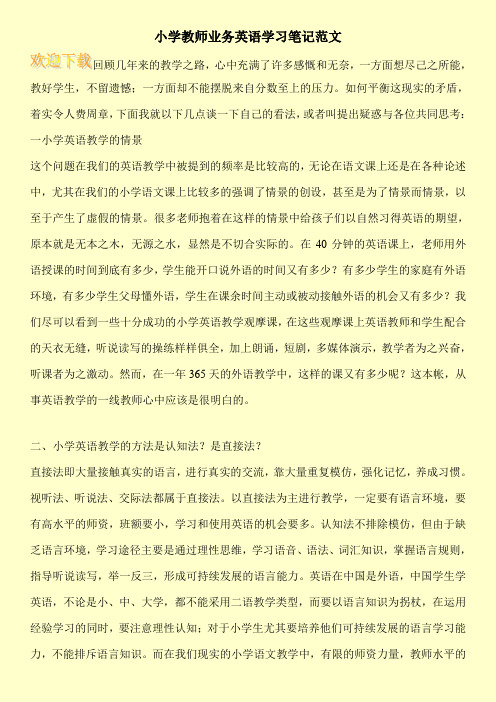
小学教师业务英语学习笔记范文回顾几年来的教学之路,心中充满了许多感慨和无奈,一方面想尽己之所能,教好学生,不留遗憾;一方面却不能摆脱来自分数至上的压力。
如何平衡这现实的矛盾,着实令人费周章,下面我就以下几点谈一下自己的看法,或者叫提出疑惑与各位共同思考:一小学英语教学的情景这个问题在我们的英语教学中被提到的频率是比较高的,无论在语文课上还是在各种论述中,尤其在我们的小学语文课上比较多的强调了情景的创设,甚至是为了情景而情景,以至于产生了虚假的情景。
很多老师抱着在这样的情景中给孩子们以自然习得英语的期望,原本就是无本之木,无源之水,显然是不切合实际的。
在40分钟的英语课上,老师用外语授课的时间到底有多少,学生能开口说外语的时间又有多少?有多少学生的家庭有外语环境,有多少学生父母懂外语,学生在课余时间主动或被动接触外语的机会又有多少?我们尽可以看到一些十分成功的小学英语教学观摩课,在这些观摩课上英语教师和学生配合的天衣无缝,听说读写的操练样样俱全,加上朗诵,短剧,多媒体演示,教学者为之兴奋,听课者为之激动。
然而,在一年365天的外语教学中,这样的课又有多少呢?这本帐,从事英语教学的一线教师心中应该是很明白的。
二、小学英语教学的方法是认知法?是直接法?直接法即大量接触真实的语言,进行真实的交流,靠大量重复模仿,强化记忆,养成习惯。
视听法、听说法、交际法都属于直接法。
以直接法为主进行教学,一定要有语言环境,要有高水平的师资,班额要小,学习和使用英语的机会要多。
认知法不排除模仿,但由于缺乏语言环境,学习途径主要是通过理性思维,学习语音、语法、词汇知识,掌握语言规则,指导听说读写,举一反三,形成可持续发展的语言能力。
英语在中国是外语,中国学生学英语,不论是小、中、大学,都不能采用二语教学类型,而要以语言知识为拐杖,在运用经验学习的同时,要注意理性认知;对于小学生尤其要培养他们可持续发展的语言学习能力,不能排斥语言知识。
中学英语教师业务笔记

中学英语教师业务笔记英语教师需具备扎实的英语知识和熟练的教学技巧,以便能够有效地传授知识给学生。
本篇业务笔记将涵盖中学英语教师需要了解和掌握的几个重要方面,包括教学方法、教学资源以及教学评估。
以下是本篇笔记的主要内容:一、教学方法1. 听说读写全面发展:英语教学应注重听、说、读、写四个方面的综合发展,促进学生在各个语言能力上的提高。
在课堂上,教师可以通过激发学生兴趣、开展交际活动以及多样化的阅读和写作训练来达到这一目的。
2. 情景教学法:情景教学法是指通过给学生创造真实语言环境,让他们在交流中学习语言。
教师可以利用图片、实物、视频等多媒体资源,设计情境,引导学生运用所学知识进行交际。
3. 合作学习:英语教学中,合作学习是一种高效的教学方法。
教师可以将学生分为小组,让他们共同合作完成任务、讨论问题等。
这样可激发学生的学习兴趣,提高他们的听说读写能力。
二、教学资源1. 教材:教师应熟悉所用教材的内容和结构,了解教材所适合的教学目标和教学方法。
教师还可以根据学生的实际情况和需求,适当调整教材内容,以提高教学的有效性。
2. 多媒体资源:现代教学中,多媒体资源的运用已成为常态。
教师可以利用投影仪、电脑等设备,播放英语视频、听力材料,让学生在真实场景中学习语言。
3. 网络资源:互联网为英语教学提供了丰富的资源。
教师可以利用英语学习网站、在线词典和语法资源等,为学生提供更多的学习材料和练习机会。
三、教学评估1. 测验与作业:教师应通过定期的测验和作业来检查学生的学习情况,并及时给出反馈。
同时,测验和作业也是激励学生学习的有效手段。
2. 课堂表现:教师可以通过观察学生在课堂上的表现来评估他们的学习水平。
例如,学生的参与度、口语表达能力和理解能力等都可以体现在课堂活动中。
3. 学业报告:定期向家长撰写学业报告是评估学生的一种有效方式。
教师可以记录学生在各个语言技能方面的进步和需要改进的地方,与家长进行沟通和交流,以促进学生的发展。
中小学教师英语业务学习笔记

中小学教师英语业务学习笔记本文旨在提供中小学教师研究英语教育业务的笔记和指导。
以下是一些主要要点和建议:1. 听力技巧- 提高英语听力技巧对中小学教师尤为重要。
建议教师通过以下途径来提高听力能力:- 多听英语录音或音频资料,包括英语课程教材中的录音和真实英语对话。
- 利用互联网资源,例如在线英语听力练或英语新闻报道。
- 参加英语听力训练班或专门的培训课程,以便获得更系统的研究。
2. 口语表达技巧- 提高中小学教师的口语表达能力对于与学生进行英语交流至关重要。
以下是一些建议:- 练口语表达,可以与其他教师或语言研究伙伴进行对话练。
- 参加英语口语培训班,研究正确的发音和口语表达技巧。
- 利用英语教学材料中的口语活动,鼓励学生积极参与英语对话。
3. 词汇和语法研究- 中小学教师应不断研究英语词汇和语法知识,以提高自己教授英语的能力。
以下是一些建议:- 系统研究英语词汇和语法知识,例如通过参加相关的培训课程。
- 广泛阅读英语书籍、文章和报纸,以提高词汇量和语法运用能力。
- 制定个人研究计划,每天预留一定时间来研究和巩固词汇和语法知识。
4. 文化背景了解- 了解英语国家的文化背景有助于中小学教师更好地教授英语并促进跨文化交流。
以下是一些建议:- 阅读关于英语国家文化的书籍和文章,了解他们的俗、传统和价值观。
- 鼓励学生了解和比较不同的文化,培养他们的跨文化意识。
- 组织与英语国家文化相关的活动,例如英语国家节日庆祝活动或文化展览。
5. 教学资源利用- 中小学教师可以利用各种教学资源来辅助英语教学。
以下是一些建议:- 利用互联网资源,例如教学网站、教育应用程序和在线课程,提供丰富的教学内容和活动。
- 制作教学课件、教学视频和其他教学资源,以便更有效地传授英语知识。
- 参考其他中小学教师的教学经验和教材,获取灵感和借鉴。
通过以上的研究笔记和指导,希望中小学教师可以提高自己的英语业务水平,为学生提供更好的英语教育。
小学教师业务英语学习笔记范文
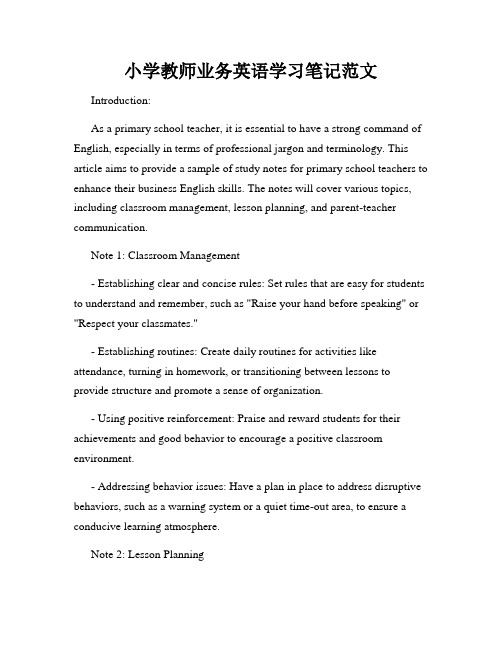
小学教师业务英语学习笔记范文Introduction:As a primary school teacher, it is essential to have a strong command of English, especially in terms of professional jargon and terminology. This article aims to provide a sample of study notes for primary school teachers to enhance their business English skills. The notes will cover various topics, including classroom management, lesson planning, and parent-teacher communication.Note 1: Classroom Management- Establishing clear and concise rules: Set rules that are easy for students to understand and remember, such as "Raise your hand before speaking" or "Respect your classmates."- Establishing routines: Create daily routines for activities like attendance, turning in homework, or transitioning between lessons to provide structure and promote a sense of organization.- Using positive reinforcement: Praise and reward students for their achievements and good behavior to encourage a positive classroom environment.- Addressing behavior issues: Have a plan in place to address disruptive behaviors, such as a warning system or a quiet time-out area, to ensure a conducive learning atmosphere.Note 2: Lesson Planning- Setting clear objectives: Clearly define the goals of each lesson and communicate them to the students so that they understand what they are expected to learn.- Adapting materials: Tailor lesson materials to suit different learning styles and abilities, ensuring that all students can actively participate and engage in the lesson.- Incorporating technology: Integrate technology tools, such as interactive whiteboards or educational apps, to make lessons more interactive and engaging.- Differentiating instruction: Provide varied activities and tasks to cater to the diverse needs of students, including visual, auditory, and kinesthetic learners.- Assessing student understanding: Regularly assess students' comprehension through formative assessments like quizzes, class discussions, or group projects to gauge their learning progress.Note 3: Parent-Teacher Communication- Maintaining regular communication: Establish a consistent communication channel with parents, such as weekly newsletters or monthly progress reports, to keep them informed about their child's academic and behavioral progress.- Organizing parent-teacher conferences: Schedule face-to-face meetings with parents to discuss individual student performance, strengths, weaknesses, and areas for improvement.- Addressing parental concerns: Actively listen to parents' concerns and address them promptly, offering possible solutions or strategies to support their child's academic success.- Encouraging parental involvement: Encourage parents to participate in school events, volunteer opportunities, or parent-teacher association meetings to foster a strong partnership between school and home.Conclusion:Enhancing business English skills is crucial for primary school teachers to effectively communicate with students, colleagues, and parents. By focusing on classroom management, lesson planning, and parent-teacher communication, teachers can create a positive and conducive learning environment for their students. Continued professional development and active engagement in language learning are essential for teachers to continuously improve their teaching practices and promote student success.。
小学英语教师业务学习笔记

小学英语教师业务学习笔记篇一:业务学习笔记2015年5、6月时间:5月7日培训形式:自学地点:办公室培训内容:作业的价值和意义是什么一、作业是提高学生学科素养的平台全面提高学生的学科素养,是新课程改革凸显的教学理念,所以,作业也应该成为培养学生素养的一个途径。
作业的布置要体现知识与能力、过程与方法、情感态度和价值观这三个维度的统一。
从知识这个角度来说,作业布置要关注知识的整合,作业应该成为各科知识整合的有效载体,既要重视本学科知识的连贯性,又要注重跨学科知识间的融合和联系。
从能力这个角度来说,作业要体现听、说、读、写、算、看、做、演等多个方面。
从综合提高学生学科素养这个角度来说,作业还要注重引导学生探究、发现,关注学生的学习过程,重视学生情感态度、思想品质、审美情趣等方面素质的培养,使作二、作业是展示学生个性才华的舞台传统的作业是学生奉命完成教师指定的任务,作业成了学生的负担,他们在抄、写、算、背的重复劳动中,渐渐失去了学习的乐趣。
其实,作业应该成为学生的一种向往,成为学生展示个性才华的一个平台。
学生应享有一定的作业自主权,只有学生有了自由自主的作业空间时,他们的个性和创造性才能得以施展,他们才真正有了展示自己生命才情的舞台。
三、作业是记录学生生命成长的站台作业是学生成长的见证,是学生生命发展的轨迹。
从这个意义上说,作业应该留下学生有意义的生命痕迹。
所以,作业要最大限度地为学生留下发展的空间,让学生各具特色的个性在作业天地里尽情地飞扬,让学生富有创造性的才华在作业星空里充分地施展和发挥,使作业成为学生自我建构知识与提升人生意义的愉快而幸福的体验。
时间:5月14日培训形式:集中培训地点:办公室培训内容呼唤:作业新的转变一、由“专制”向“自主”转变作业应该走出教师单方面说了算的“专制”格局,让学生享有一定的自主权。
在作业布置上,要建立起师生的互动平台,让学生有一定的自由度;在作业要求上,要改变“大一统”的作业模式,考虑不同层次和不同特点的学生的需求,既让优秀生“吃得饱”,也让学困生“吃得好”;在作业内容上,要为学生留有自主选择和自由发挥的天地,给学生以挥洒才情的舞台;在作业批改上,也要适当为学生提供参与评改的时机,让他们“弹奏自己心爱的土琵琶”。
优秀英语教师业务学习笔记范本

优秀英语教师业务学习笔记范本在新课程改革实验不断推进的今天, 我认为做一个中学英语教师决不能没有激情, 不富有激情的人就不能称其为一个上乘的英语教师。
那么, 如何使自己成为充满激情的老师呢? 如何创设一个积极互动开放的教学情境, 使英语教学事半功倍呢?一、做一个充满激情的英语教师, 首先要热爱生活、热爱英语、热爱学生, 在自己的心中时常蓄积着犹如岩浆般的滚烫的情, 让每一个学生心底里沉淀的情发酵、释放。
在平时的交流中, 老师要让学生感觉到我们同他们的关系十分重要。
老师也许是喜欢学生的, 但可能所作所为却恰恰相反, 如推迟上下课, 不重视学生的时间; 提供的材料不是太简单就是太难, 不能针对学生的实际能力; 不提供相互交往或讨论的机会, 无视学生的想法; 不考虑学生的安排、问题或担忧, 表现出对学生漠不关心; 不按时上班或抽空去看学生, 不尊重学生的需求, 尤其是他们课外的个人需求; 无节制的幽默或使用嘲讽的语句等。
看不起学生或是使他们难为情可能使学生产生强烈的痛苦, 摧毁自信, 酝酿敌视。
当然我们热爱学生, 就要在我们的行为中清清楚楚地表露出来; 热爱学生包括对他们的需求和兴趣爱好的欣赏。
这密切关系到我们了解学生如何学和他们需要什么帮助, 以便去鼓励这种学习, 也包括我们将其当作学习者直接或间接的鼓励。
在课堂上就反映在我们自发的行为和对班上成员持续不断的敏感程度之中。
二、要有幽默感。
《英语课程标准》中指出:“学生只有对自己、对英语及其文化、对英语学习有积极的情感, 才能保持英语学习的动力并取得成绩。
消极的情感不仅会影响英语学习的效果, 而且会影响学生的长远发展。
因此, 在英语教学中教师应该自始至终关注学生的情感, 努力营造宽松、民主、和谐的教学氛围。
戏剧大师莎士比亚也曾说:“幽默是风趣和智慧的展现。
”“幽默”一词是英文humor的译音, 它是一种个人独特的气质,它是一种高超的艺术, 有声的或者是无声的。
英语教师讲课稿模板范文
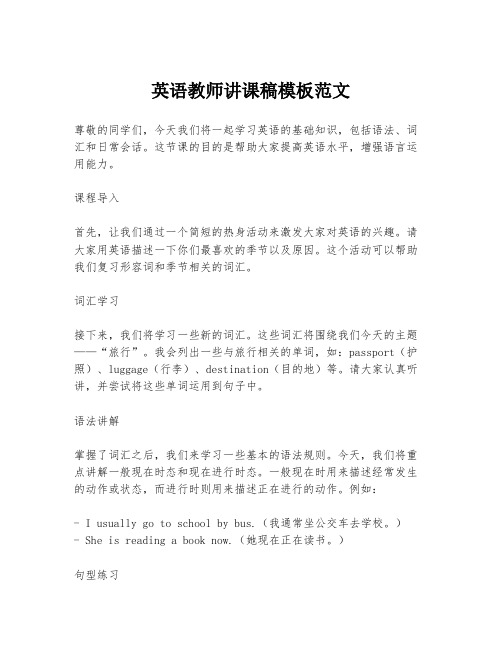
英语教师讲课稿模板范文尊敬的同学们,今天我们将一起学习英语的基础知识,包括语法、词汇和日常会话。
这节课的目的是帮助大家提高英语水平,增强语言运用能力。
课程导入首先,让我们通过一个简短的热身活动来激发大家对英语的兴趣。
请大家用英语描述一下你们最喜欢的季节以及原因。
这个活动可以帮助我们复习形容词和季节相关的词汇。
词汇学习接下来,我们将学习一些新的词汇。
这些词汇将围绕我们今天的主题——“旅行”。
我会列出一些与旅行相关的单词,如:passport(护照)、luggage(行李)、destination(目的地)等。
请大家认真听讲,并尝试将这些单词运用到句子中。
语法讲解掌握了词汇之后,我们来学习一些基本的语法规则。
今天,我们将重点讲解一般现在时态和现在进行时态。
一般现在时用来描述经常发生的动作或状态,而进行时则用来描述正在进行的动作。
例如:- I usually go to school by bus.(我通常坐公交车去学校。
)- She is reading a book now.(她现在正在读书。
)句型练习为了巩固我们的语法知识,我们将进行一些句型练习。
请大家根据我提供的情境,用正确的时态构造句子。
例如:情境:你的朋友正在度假。
句子:Your friend is enjoying his vacation.听力训练听力是语言学习中非常重要的一部分。
今天,我们将听一段关于旅行的对话,并回答几个问题。
请大家仔细听,并尝试理解对话的主要内容。
口语练习现在,让我们通过角色扮演来练习口语。
请大家分成小组,每组选择一个旅行场景,如:在机场、在酒店、在旅游景点等。
然后,用英语进行对话,模拟旅行中可能遇到的情况。
写作练习最后,我们将进行写作练习。
请大家写一篇短文,描述你梦想中的旅行。
你可以包括目的地、旅行计划、以及你期待的体验。
课程总结在课程的最后,我们将回顾今天学到的所有内容。
请大家思考一下,你今天学到了哪些新知识?你如何将这些知识应用到实际生活中?作业布置作为课后作业,请大家准备一个简短的英语演讲,主题是“我的旅行计划”。
优秀英语教师业务学习笔记范本

优秀英语教师业务学习笔记范本在新课程改革实验不断推进的今天, 我认为做一个中学英语教师决不能没有激情, 不富有激情的人就不能称其为一个上乘的英语教师。
那么, 如何使自己成为充满激情的老师呢? 如何创设一个积极互动开放的教学情境, 使英语教学事半功倍呢?一、做一个充满激情的英语教师, 首先要热爱生活、热爱英语、热爱学生, 在自己的心中时常蓄积着犹如岩浆般的滚烫的情, 让每一个学生心底里沉淀的情发酵、释放。
在平时的交流中, 老师要让学生感觉到我们同他们的关系十分重要。
老师也许是喜欢学生的, 但可能所作所为却恰恰相反, 如推迟上下课, 不重视学生的时间; 提供的材料不是太简单就是太难, 不能针对学生的实际能力; 不提供相互交往或讨论的机会, 无视学生的想法; 不考虑学生的安排、问题或担忧, 表现出对学生漠不关心; 不按时上班或抽空去看学生, 不尊重学生的需求, 尤其是他们课外的个人需求; 无节制的幽默或使用嘲讽的语句等。
看不起学生或是使他们难为情可能使学生产生强烈的痛苦, 摧毁自信, 酝酿敌视。
当然我们热爱学生, 就要在我们的行为中清清楚楚地表露出来; 热爱学生包括对他们的需求和兴趣爱好的欣赏。
这密切关系到我们了解学生如何学和他们需要什么帮助, 以便去鼓励这种学习, 也包括我们将其当作学习者直接或间接的鼓励。
在课堂上就反映在我们自发的行为和对班上成员持续不断的敏感程度之中。
二、要有幽默感。
《英语课程标准》中指出:“学生只有对自己、对英语及其文化、对英语学习有积极的情感, 才能保持英语学习的动力并取得成绩。
消极的情感不仅会影响英语学习的效果, 而且会影响学生的长远发展。
因此, 在英语教学中教师应该自始至终关注学生的情感, 努力营造宽松、民主、和谐的教学氛围。
戏剧大师莎士比亚也曾说:“幽默是风趣和智慧的展现。
”“幽默”一词是英文humor的译音, 它是一种个人独特的气质,它是一种高超的艺术, 有声的或者是无声的。
中小学教师业务英语学习笔记范文格式
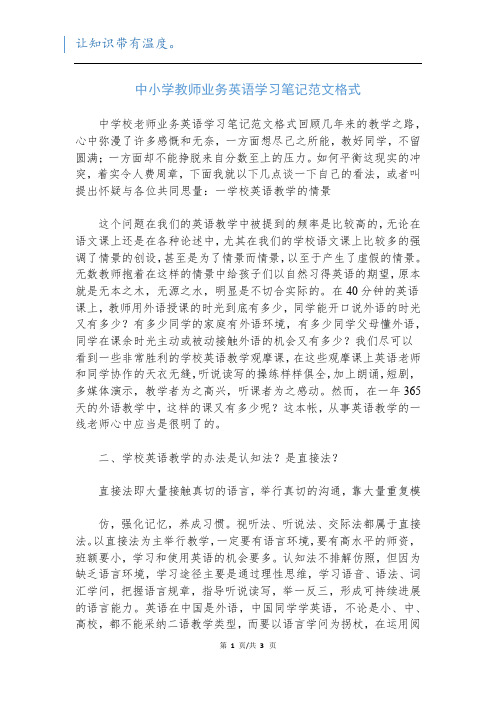
让知识带有温度。
中小学教师业务英语学习笔记范文格式中学校老师业务英语学习笔记范文格式回顾几年来的教学之路,心中弥漫了许多感慨和无奈,一方面想尽己之所能,教好同学,不留圆满;一方面却不能挣脱来自分数至上的压力。
如何平衡这现实的冲突,着实令人费周章,下面我就以下几点谈一下自己的看法,或者叫提出怀疑与各位共同思量:一学校英语教学的情景这个问题在我们的英语教学中被提到的频率是比较高的,无论在语文课上还是在各种论述中,尤其在我们的学校语文课上比较多的强调了情景的创设,甚至是为了情景而情景,以至于产生了虚假的情景。
无数教师抱着在这样的情景中给孩子们以自然习得英语的期望,原本就是无本之木,无源之水,明显是不切合实际的。
在40分钟的英语课上,教师用外语授课的时光到底有多少,同学能开口说外语的时光又有多少?有多少同学的家庭有外语环境,有多少同学父母懂外语,同学在课余时光主动或被动接触外语的机会又有多少?我们尽可以看到一些非常胜利的学校英语教学观摩课,在这些观摩课上英语老师和同学协作的天衣无缝,听说读写的操练样样俱全,加上朗诵,短剧,多媒体演示,教学者为之高兴,听课者为之感动。
然而,在一年365天的外语教学中,这样的课又有多少呢?这本帐,从事英语教学的一线老师心中应当是很明了的。
二、学校英语教学的办法是认知法?是直接法?直接法即大量接触真切的语言,举行真切的沟通,靠大量重复模仿,强化记忆,养成习惯。
视听法、听说法、交际法都属于直接法。
以直接法为主举行教学,一定要有语言环境,要有高水平的师资,班额要小,学习和使用英语的机会要多。
认知法不排解仿照,但因为缺乏语言环境,学习途径主要是通过理性思维,学习语音、语法、词汇学问,把握语言规章,指导听说读写,举一反三,形成可持续进展的语言能力。
英语在中国是外语,中国同学学英语,不论是小、中、高校,都不能采纳二语教学类型,而要以语言学问为拐杖,在运用阅第1页/共3页千里之行,始于足下历学习的同时,要注重理性认知;对于学校生尤其要培养他们可持续进展的语言学习能力,不能排斥语言学问。
英语教师讲课稿模板

英语教师讲课稿模板尊敬的同学们,今天我们将一起探索英语的世界。
在开始我们的课程之前,我想强调学习英语的重要性。
英语不仅是全球通用的语言,也是我们了解世界、沟通交流的重要工具。
因此,掌握英语对于我们每个人来说都是至关重要的。
课程目标在本节课中,我们将学习以下几个方面:1. 掌握一些基本的英语词汇。
2. 学习简单的英语句型结构。
3. 练习英语听力和口语表达。
4. 了解英语文化背景,提高跨文化交际能力。
课程内容一、词汇学习首先,我们将学习一些与日常生活密切相关的英语词汇。
这些词汇将帮助我们更好地理解和使用英语。
- Family Members: father, mother, brother, sister, etc.- Daily Activities: eat, sleep, study, work, etc.- Common Objects: book, pen, chair, table, etc.请大家跟读这些词汇,并尝试造句。
二、句型结构接下来,我们将学习一些基本的英语句型结构,这将帮助我们构建完整的句子。
- 陈述句:I am a student.- 疑问句:Are you a student?- 祈使句:Please sit down.- 感叹句:What a beautiful day!我们将通过练习来加深对这些句型的理解。
三、听力与口语练习听力和口语是英语交流中非常重要的两个方面。
我们将通过以下活动来提高我们的听力和口语能力。
- 听力练习:听一段简短的对话或故事,并回答问题。
- 角色扮演:根据给定的情景,进行角色扮演,练习对话。
- 口语表达:就某一话题进行讨论,表达自己的观点。
四、文化背景知识了解英语国家的文化背景对于我们学习英语同样重要。
今天我们将了解一些基本的英语国家文化习俗。
- Greetings: 英语国家常见的问候方式。
- Table Manners: 餐桌礼仪。
- Festivals: 英语国家的重要节日。
优秀教师演讲稿英语笔记
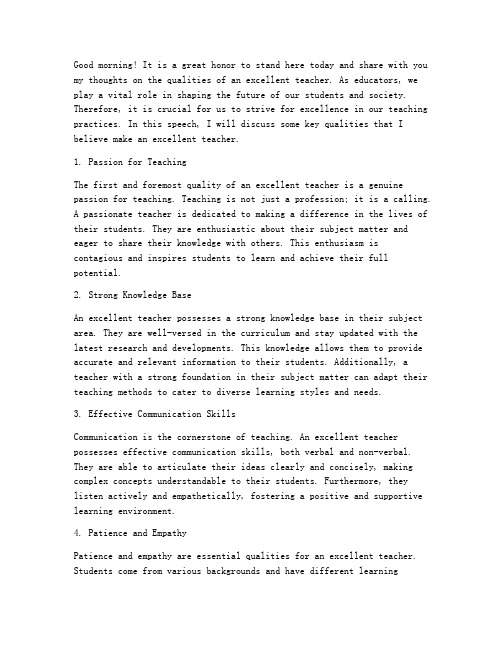
Good morning! It is a great honor to stand here today and share with you my thoughts on the qualities of an excellent teacher. As educators, we play a vital role in shaping the future of our students and society. Therefore, it is crucial for us to strive for excellence in our teaching practices. In this speech, I will discuss some key qualities that I believe make an excellent teacher.1. Passion for TeachingThe first and foremost quality of an excellent teacher is a genuine passion for teaching. Teaching is not just a profession; it is a calling.A passionate teacher is dedicated to making a difference in the lives of their students. They are enthusiastic about their subject matter and eager to share their knowledge with others. This enthusiasm iscontagious and inspires students to learn and achieve their full potential.2. Strong Knowledge BaseAn excellent teacher possesses a strong knowledge base in their subject area. They are well-versed in the curriculum and stay updated with the latest research and developments. This knowledge allows them to provide accurate and relevant information to their students. Additionally, a teacher with a strong foundation in their subject matter can adapt their teaching methods to cater to diverse learning styles and needs.3. Effective Communication SkillsCommunication is the cornerstone of teaching. An excellent teacher possesses effective communication skills, both verbal and non-verbal. They are able to articulate their ideas clearly and concisely, making complex concepts understandable to their students. Furthermore, they listen actively and empathetically, fostering a positive and supportive learning environment.4. Patience and EmpathyPatience and empathy are essential qualities for an excellent teacher. Students come from various backgrounds and have different learningspeeds and abilities. An excellent teacher understands that progress takes time and provides support and encouragement to help students succeed. They are patient with their students' mistakes and celebrate their achievements, no matter how small.5. AdaptabilityThe ability to adapt is crucial in the ever-changing educational landscape. An excellent teacher is flexible and open to new ideas and methods. They are willing to try different teaching strategies and are not afraid to make mistakes. This adaptability allows them to cater to the diverse needs of their students and stay relevant in their field.6. Strong Work EthicAn excellent teacher has a strong work ethic. They are committed totheir profession and dedicated to continuous improvement. They spend time planning and preparing their lessons, ensuring that they are engaging and effective. They also take the time to grade assignments, provide feedback, and communicate with parents and guardians.7. Relationship BuildingAn excellent teacher understands the importance of building positive relationships with their students. They take the time to get to know their students, their interests, and their challenges. This helps create a sense of trust and rapport, which is essential for effective learning.A teacher who cares about their students is more likely to inspire them to reach their goals.8. Continuous LearningAn excellent teacher is a lifelong learner. They are committed to their own professional development and seek opportunities to expand their knowledge and skills. They participate in workshops, conferences, and other educational activities to stay updated with the latest trends and best practices in teaching.9. Leadership and AdvocacyAn excellent teacher is a leader and an advocate for their students. They take a stand for what is best for their students and work collaboratively with colleagues, administrators, and parents to create a positive and supportive educational environment. They also advocate for educational policies that benefit their students and the profession as a whole.In conclusion, an excellent teacher possesses a unique combination of qualities that make them effective in their role. They are passionate, knowledgeable, communicative, patient, adaptable, and dedicated to their students' success. By embodying these qualities, we can inspire our students to reach their full potential and contribute positively to society.Thank you for your attention, and let us continue to strive for excellence in our teaching practices, for the sake of our students and the future of our world.Goodbye!。
教师演讲稿英语笔记排版
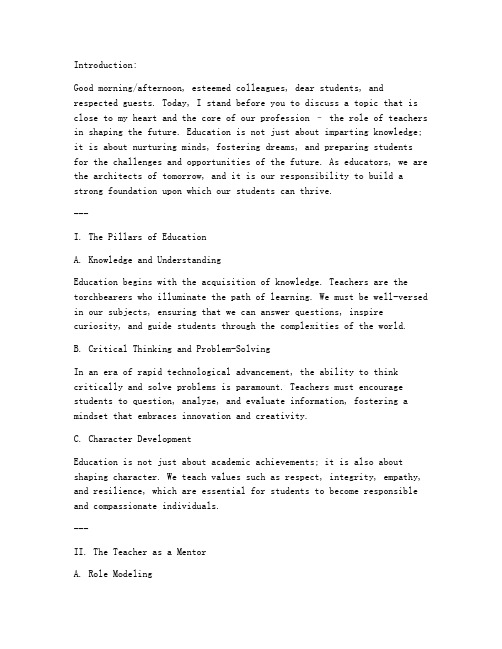
Introduction:Good morning/afternoon, esteemed colleagues, dear students, and respected guests. Today, I stand before you to discuss a topic that is close to my heart and the core of our profession – the role of teachers in shaping the future. Education is not just about imparting knowledge; it is about nurturing minds, fostering dreams, and preparing studentsfor the challenges and opportunities of the future. As educators, we are the architects of tomorrow, and it is our responsibility to build a strong foundation upon which our students can thrive.---I. The Pillars of EducationA. Knowledge and UnderstandingEducation begins with the acquisition of knowledge. Teachers are the torchbearers who illuminate the path of learning. We must be well-versed in our subjects, ensuring that we can answer questions, inspire curiosity, and guide students through the complexities of the world.B. Critical Thinking and Problem-SolvingIn an era of rapid technological advancement, the ability to think critically and solve problems is paramount. Teachers must encourage students to question, analyze, and evaluate information, fostering a mindset that embraces innovation and creativity.C. Character DevelopmentEducation is not just about academic achievements; it is also about shaping character. We teach values such as respect, integrity, empathy, and resilience, which are essential for students to become responsible and compassionate individuals.---II. The Teacher as a MentorA. Role ModelingAs teachers, we are constantly role modeling. Our words, actions, and attitudes reflect the values we hold dear. By being ethical, professional, and passionate about our work, we inspire students to emulate these qualities.B. Encouraging Personal GrowthEach student is unique, with their own strengths, weaknesses, and dreams. It is our role to encourage personal growth, supporting students in exploring their interests and talents, and helping them to develop a sense of self-worth.C. Nurturing RelationshipsBuilding strong relationships with students is crucial. By showing genuine care and concern, we create a supportive learning environment where students feel safe to express themselves and take risks.---III. The Challenges and Opportunities of the 21st CenturyA. Technological IntegrationThe integration of technology in education is both a challenge and an opportunity. Teachers must adapt to new teaching methods and tools, ensuring that students are equipped with the skills needed to thrive ina digital world.B. Diverse LearnersOur classrooms are increasingly diverse, with students from various cultural, linguistic, and socioeconomic backgrounds. It is our responsibility to create inclusive environments where every studentfeels valued and has equal opportunities to succeed.C. Global CitizenshipIn an interconnected world, it is essential for students to develop a global perspective. Teachers can foster this by incorporatinginternational perspectives into the curriculum and encouraging students to engage with global issues.---IV. The Future of EducationA. Continuous LearningThe world is constantly changing, and teachers must be lifelong learners. By staying updated with the latest research and pedagogical approaches, we can provide our students with the best possible education.B. CollaborationEducation is a collaborative effort. By working together with colleagues, parents, and the community, we can create a more cohesive and effective educational system.C. InnovationWe must embrace innovation in education, exploring new methods and technologies that can enhance learning experiences and outcomes.---Conclusion:In conclusion, teachers are the architects of the future, shaping the minds of tomorrow. Our role is multifaceted, encompassing the transmission of knowledge, the nurturing of character, and the fostering of personal growth. As we navigate the challenges and opportunities of the 21st century, let us remember that our students are our greatest legacy. By being dedicated, passionate, and innovative educators, we can create a future where every student has the opportunity to thrive and contribute to the world.Thank you.。
教师演讲稿英语学习笔记
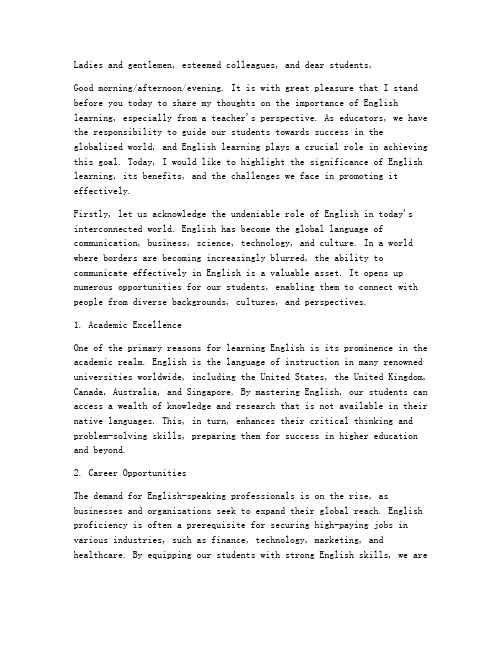
Ladies and gentlemen, esteemed colleagues, and dear students,Good morning/afternoon/evening. It is with great pleasure that I stand before you today to share my thoughts on the importance of English learning, especially from a teacher's perspective. As educators, we have the responsibility to guide our students towards success in the globalized world, and English learning plays a crucial role in achieving this goal. Today, I would like to highlight the significance of English learning, its benefits, and the challenges we face in promoting it effectively.Firstly, let us acknowledge the undeniable role of English in today's interconnected world. English has become the global language of communication, business, science, technology, and culture. In a world where borders are becoming increasingly blurred, the ability to communicate effectively in English is a valuable asset. It opens up numerous opportunities for our students, enabling them to connect with people from diverse backgrounds, cultures, and perspectives.1. Academic ExcellenceOne of the primary reasons for learning English is its prominence in the academic realm. English is the language of instruction in many renowned universities worldwide, including the United States, the United Kingdom, Canada, Australia, and Singapore. By mastering English, our students can access a wealth of knowledge and research that is not available in their native languages. This, in turn, enhances their critical thinking and problem-solving skills, preparing them for success in higher education and beyond.2. Career OpportunitiesThe demand for English-speaking professionals is on the rise, as businesses and organizations seek to expand their global reach. English proficiency is often a prerequisite for securing high-paying jobs in various industries, such as finance, technology, marketing, and healthcare. By equipping our students with strong English skills, we areempowering them to compete in the global job market and achieve their career aspirations.3. Cultural ExchangeEnglish learning fosters cultural exchange and appreciation. Through English, our students can explore the rich literature, films, music, and art from English-speaking countries. This exposure not only broadens their horizons but also promotes empathy, understanding, and respect for different cultures.4. Personal DevelopmentEnglish learning contributes to personal development by enhancing cognitive abilities, such as memory, concentration, and critical thinking. It also fosters independence, as students learn to navigate new environments and communicate effectively with peers and mentors.However, despite the numerous benefits of English learning, we face several challenges in promoting it effectively. Here are some of the key issues:1. Language BarriersMany students come from diverse linguistic backgrounds, and overcoming language barriers is a significant challenge. As teachers, we must adapt our teaching methods to cater to the varying levels of English proficiency in our classrooms. This may involve using visual aids, gestures, and translational tools to facilitate communication.2. Limited ResourcesIn some regions, limited resources such as textbooks, audiovisual materials, and qualified teachers hinder the effective promotion of English learning. We must advocate for increased investment in education to bridge this gap and provide our students with the necessary tools for success.3. Low MotivationStudents may lack motivation to learn English due to various reasons, such as the perception that it is unnecessary or irrelevant to their lives. As educators, we must ignite their passion for English by showcasing its practical applications and emphasizing its importance in their future endeavors.4. Cultural MisunderstandingsEnglish learning may sometimes lead to cultural misunderstandings, as language is deeply intertwined with culture. We must educate our students about cultural nuances and promote respect for diverse perspectives.In conclusion, English learning is of paramount importance in today's globalized world. As teachers, we have the responsibility to equip our students with the skills and knowledge they need to thrive in an increasingly interconnected society. By addressing the challenges we face and fostering a love for English learning, we can help our students unlock their full potential and achieve success in all aspects of their lives.Thank you for your attention. I look forward to engaging in a meaningful discussion with you on this critical issue.。
英语教师业务演讲稿
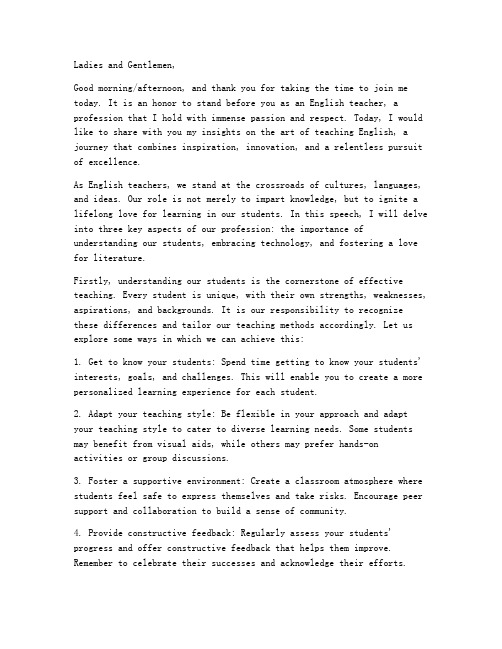
Ladies and Gentlemen,Good morning/afternoon, and thank you for taking the time to join me today. It is an honor to stand before you as an English teacher, a profession that I hold with immense passion and respect. Today, I would like to share with you my insights on the art of teaching English, a journey that combines inspiration, innovation, and a relentless pursuit of excellence.As English teachers, we stand at the crossroads of cultures, languages, and ideas. Our role is not merely to impart knowledge, but to ignite a lifelong love for learning in our students. In this speech, I will delve into three key aspects of our profession: the importance of understanding our students, embracing technology, and fostering a love for literature.Firstly, understanding our students is the cornerstone of effective teaching. Every student is unique, with their own strengths, weaknesses, aspirations, and backgrounds. It is our responsibility to recognize these differences and tailor our teaching methods accordingly. Let us explore some ways in which we can achieve this:1. Get to know your students: Spend time getting to know your students' interests, goals, and challenges. This will enable you to create a more personalized learning experience for each student.2. Adapt your teaching style: Be flexible in your approach and adapt your teaching style to cater to diverse learning needs. Some students may benefit from visual aids, while others may prefer hands-onactivities or group discussions.3. Foster a supportive environment: Create a classroom atmosphere where students feel safe to express themselves and take risks. Encourage peer support and collaboration to build a sense of community.4. Provide constructive feedback: Regularly assess your students' progress and offer constructive feedback that helps them improve. Remember to celebrate their successes and acknowledge their efforts.Moving on to the second aspect, embracing technology is crucial intoday's rapidly evolving educational landscape. As English teachers, we must harness the power of technology to enhance our teaching and engage our students in new and exciting ways. Here are a few suggestions:1. Utilize educational apps and online resources: There are numerous apps and websites designed specifically for language learning. These tools can help students practice grammar, vocabulary, and pronunciation in their own time.2. Incorporate multimedia elements: Use videos, podcasts, andinteractive quizzes to make your lessons more dynamic and engaging. This will cater to different learning styles and keep your students motivated.3. Create digital portfolios: Encourage students to create digital portfolios that showcase their work and progress. This will help them reflect on their learning journey and set personal goals.4. Use social media responsibly: Platforms like Twitter and Instagram can be used to connect with students outside the classroom, share resources, and provide additional support.Finally, fostering a love for literature is an essential part of ourrole as English teachers. Literature has the power to transform lives, inspire change, and deepen our understanding of the human experience. Here are some strategies to help cultivate this love:1. Share your passion: Be enthusiastic about the literature you teach. Your excitement will be contagious and motivate your students to explore the world of books.2. Encourage reading for pleasure: Create opportunities for students to read a variety of genres and styles. Encourage them to share their thoughts and feelings about the texts they read.3. Integrate literature across the curriculum: Use literature to complement other subjects, such as history, science, and the arts. This will help students see the relevance of English in their everyday lives.4. Organize literary events: Host book clubs, author visits, andliterary competitions to create a sense of community and shared excitement for literature.In conclusion, the art of teaching English is a multifaceted journeythat requires dedication, creativity, and a deep understanding of our students. By embracing these three key aspects—understanding our students, embracing technology, and fostering a love for literature—we can create a transformative learning experience for our students.As we move forward, let us remember that teaching is not just a profession; it is an act of service. It is our duty to inspire, motivate, and empower our students to become lifelong learners and compassionate citizens of the world.Thank you for your attention, and I look forward to continuing this journey of inspiration and innovation alongside all of you.[Applause]。
- 1、下载文档前请自行甄别文档内容的完整性,平台不提供额外的编辑、内容补充、找答案等附加服务。
- 2、"仅部分预览"的文档,不可在线预览部分如存在完整性等问题,可反馈申请退款(可完整预览的文档不适用该条件!)。
- 3、如文档侵犯您的权益,请联系客服反馈,我们会尽快为您处理(人工客服工作时间:9:00-18:30)。
优秀英语教师业务学习笔记范本
优秀英语教师业务学习笔记范本
在新课程改革实验不断推进的今天, 我认为做一个中学英语教师决不能没有激情, 不富有激情的人就不能称其为一个上乘的英语教师。
那么, 如何使自己成为充满激情的老师呢? 如何创设一个积极互动开放的教学情境, 使英语教学事半功倍呢?
一、做一个充满激情的英语教师, 首先要热爱生活、热爱英语、热爱学生, 在自己的心中时常蓄积着犹如岩浆般的滚烫的情, 让每一个学生心底里沉淀的情发酵、释放。
在平时的交流中, 老师要让学生感觉到我们同他们的关系十分重要。
老师也许是喜欢学生的, 但可能所作所为却恰恰相反, 如推迟上下课, 不重视学生的时间; 提供的材料不是太简单就是太难, 不能针对学生的实际能力; 不提供相互交往或讨论的机会, 无视学生的想法; 不考虑学生的安排、问题或担忧, 表现出对学生漠不关心; 不按时上班或抽空去看学生, 不尊重学生的需求, 尤其是他们课外的个人需求; 无节制的幽默或使用嘲讽的语句等。
看不起学生或是使他们难为情可能使学生产生强烈的痛苦, 摧毁自信, 酝酿敌视。
当然我们热爱学生, 就要在我们的行为中清清楚楚地表露出来; 热爱学生包括对他们的需求和兴趣爱好的欣赏。
这密切关系到我们了解学生如何学和他们需要什么帮助, 以便去鼓励这种学习, 也包括我们将其当作学习者直接或间接的鼓励。
在课堂上就反映在我们自发的行为和对班上成员持续不断的敏感程度之中。
二、要有幽默感。
《英语课程标准》中指出:“学生只有对自
己、对英语及其文化、对英语学习有积极的情感, 才能保持英语学
习的动力并取得成绩。
消极的情感不仅会影响英语学习的效果, 而
且会影响学生的长远发展。
因此, 在英语教学中教师应该自始至终
关注学生的情感, 努力营造宽松、民主、和谐的教学氛围。
戏剧大
师莎士比亚也曾说:“幽默是风趣和智慧的展现。
”“幽默”一词是
英文humor的译音, 它是一种个人独特的气质,它是一种高超的艺术, 有声的或者是无声的。
也有人说, 幽默既是一种语言艺术, 又是一
种行为特征。
从心理学上讲, 人们大都喜欢幽默的故事, 欣赏富有
幽默感的人。
因此, 一位英语教师有一份幽默, 在英语教学中恰当
运用幽默, 能激发学生的情感, 引起他们的喜悦和欢乐, 他们获得
精神上的享受和快感, 从而激发学生的学习兴趣和学习主动性, 帮
助学生加深对知识的理解和记忆, 提高课堂教学效率。
这样教师的
教学就有了个性魅力和智慧的光彩, 就能把一些抽象的、复杂的教
学内容, 以一种生动而饶有兴味的形式表现出来, 强烈地吸引学生
的注意力, 降低教学难度, 进而达到良好的教学效果。
三、营造“激趣→创景→启发→探求→交际”的教学互动过
程。
传统的英语课堂教学, 只重视英语知识的机械输入和积累, 而
忽视学生学习英语过程的启发, 特别是英语语言的实践活动等过程, 造成学生被动学习, 课堂气氛缺乏活力和生机,师生之间缺少情感交流,无有效互动。
而新课改理论指导下的课堂教学则要求: 教师在组
织课堂教学中, 不仅要有效灵活地传授知识和技能, 同时, 还要激
活课堂气氛, 调节学生学习兴趣, 师生之间要进行情感交流, 教学互动。
四、教学要有智慧, 把握好英语课堂教学抒发激情的最佳时机, 使英语课堂教学波澜迭起, 收获多多。
高超的教育教学技巧, 驾轻就熟, 不落窠臼, 让英语课堂教学永远保持一种清新的感觉, 让学生丝毫觉察不到教师人为的痕迹。
我们必须深信自己的知识。
英语教学并非单纯机械的单词和语法知识积累, 句型的操练和课文的讲解, 而是开启学生获取知识和能力的智慧天窗。
在组织教学中, 教师要根据学生的心理欲望, 释放出内心的激情, 让他们独立地、创造性地发现问题, 分析问题, 解决问题, 主动积极地参与英语课堂教学, 轻松愉快地学习。
而这一切是否能够顺利做到, 和老师运用自身的热情来调动学生是有很大关系的。
当然, 只有激情也不行, 还要有宽容、严谨、沉稳等素质,总而言之, 一个好的教师应该是: 宽容中有严谨, 严谨中有幽默, 幽默中有沉稳, 沉稳中有激情。
激情是火, 可以点燃学生的求知欲望; 激情是露, 可以滋润学生干渴的心田; 激情如风, 可以吹皱学生平静的心湖; 激情如雷, 可以震醒学生懵懂的迷梦。
让我们激情飞扬、缔造辉煌! 当我们走进英语课堂, 我们的生命将充满激情; 当学生走出英语课堂, 他们的人生将更加辉煌!!!。
